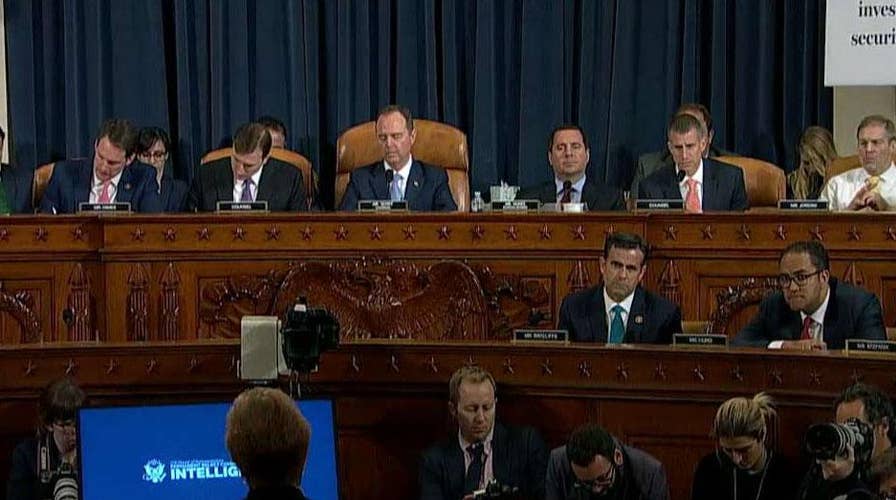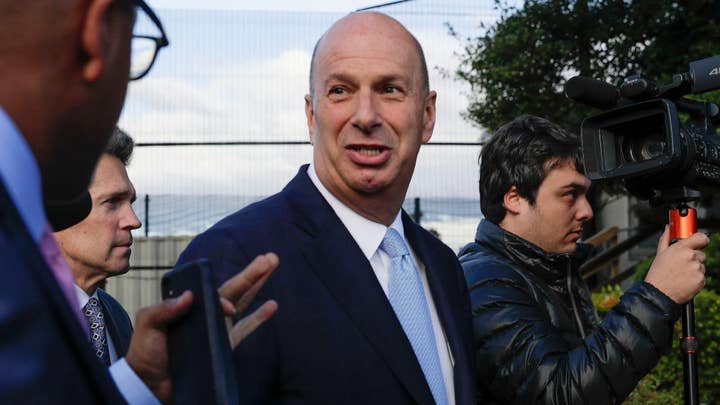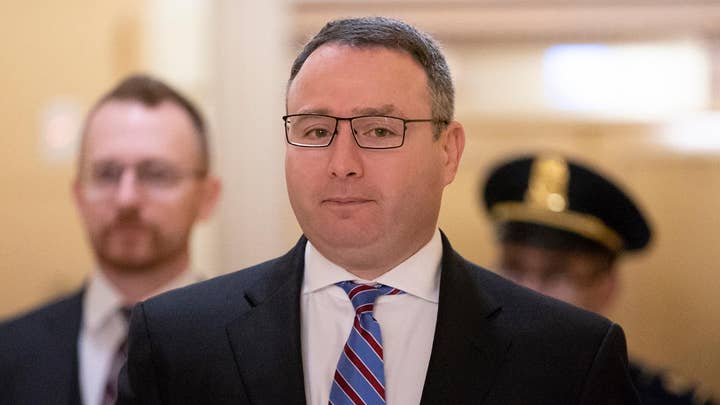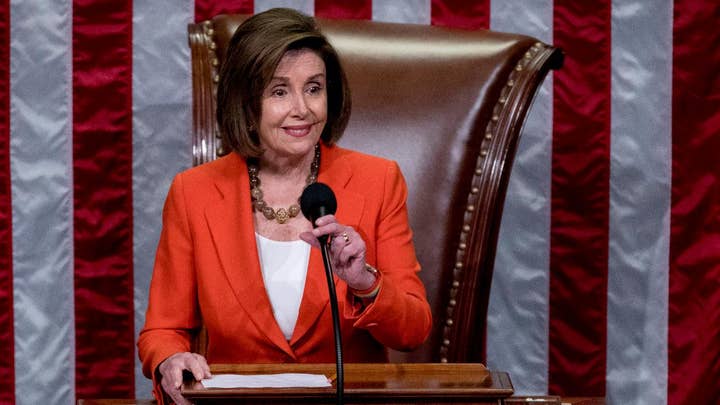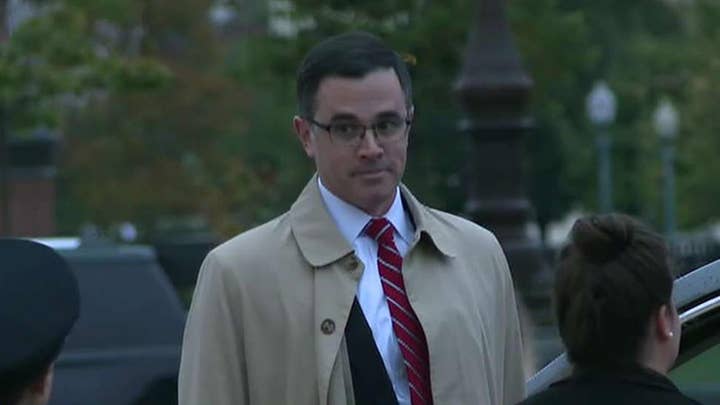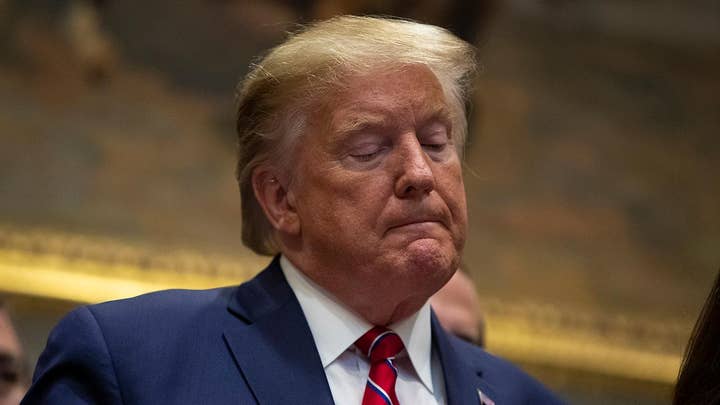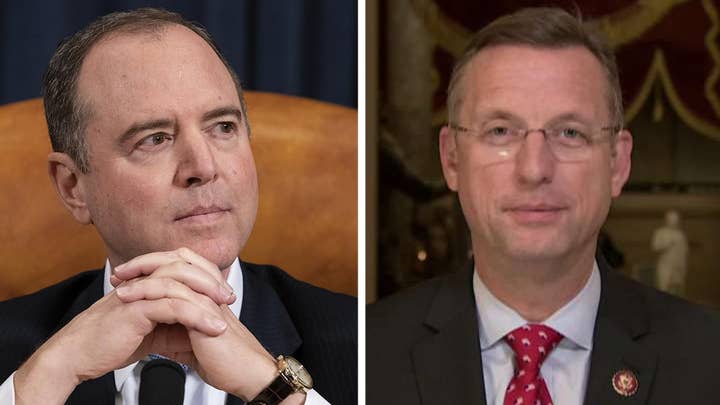Key impeachment witnesses set to testify during week two of public House hearings
Nine witnesses, including Lt. Col. Alexander Vindman and Amb. Gordon Sondland, are slated to testify publicly over a period of three days; Gillian Turner reports from Capitol Hill.
Beginning Tuesday morning, in a rush of five hearings ahead of the Thanksgiving recess, nine witnesses -- including several who have provided inconsistent accounts of key events -- are set to testify over three days in what could be a make-or-break week in House Democrats' impeachment investigation.
Less than 24 hours before the proceedings are set to be gaveled in at 9 a.m. ET, President Trump floated the idea of testifying, rather than tweeting, during the inquiry. A top Republican called for a last-minute postponement, citing secretive new developments behind closed doors. And, the Trump campaign has pointed out apparent inconsistencies in some testimony already on the record.
The key witness to focus on amid the rapid-fire series of developments is likely to be Ambassador to the European Union Gordon Sondland, the wealthy donor who has bragged about his proximity to President Trump -- and who repeatedly has frustrated Democrats' narrative by contradicting several other key witnesses in the probe. Though he won't testify until Wednesday, Sondland will loom large in Tuesday morning's proceedings.
DEM WITNESS ADMITS HE BLABBED ABOUT OVERHEARD TRUMP CALL, CALLS IT 'LIKE, AN EXTRAORDINARY THING'
In part, that's because Sondland previously testified behind closed doors that Trump directly told him there were to be "no quid pro quos of any kind" with Ukraine, and that he didn’t recall any conversations with the White House about withholding military assistance in return for Ukraine helping with the president’s political campaign. Democrats have alleged that Trump held up the aid to ensure a public probe into the Ukraine business dealings of former Vice President Joe Biden and his son Hunter.
Then, William Taylor, the U.S. chargé d'affaires for Ukraine, told lawmakers that Sondland himself said "everything" — a White House visit for Ukraine's new leader and the release of military aid to the former Soviet republic — was contingent on a public announcement of investigations into the 2016 election and into Ukraine gas company Burisma. (Hunter Biden held a highly lucrative role on the board of Burisma, despite having little relevant experience, while his father oversaw Ukraine policy as vice president.)
Weeks later, after testimony from Taylor and National Security Council [NSC] official Tim Morrison placed him at the center of key discussions, Sondland suddenly amended his testimony and claimed his recollection had been "refreshed." Sondland said he now could recall a September conversation in which he told an aide to Ukraine President Volodymyr Zelensky that military aid likely would not occur until Ukraine made public announcements about corruption investigations. Sondland said he came to "understand" that arrangement from other sources.
Morrison, the NSC's outgoing senior director of European and Russian affairs and White House deputy assistant, is to testify Tuesday afternoon. In his closed-door deposition, which Democrats released over the weekend, Morrison said Trump didn't want tax dollars funding Ukrainian corruption, and remarked that he wasn't concerned Trump's calls with Ukraine's leader were tied to his political interests.
'CANNOT BE TRUE' -- MAJOR INCONSISTENCY EMERGES IN BILL TAYLOR'S TESTIMONY
Additionally, Sondland has insisted he knew acting White House Chief of Staff Mick Mulvaney only well enough to wave and say hello — and that’s about it. He said he may have spoken to him once or twice on the phone, but not about Ukraine. Meanwhile, Lt. Col. Alexander Vindman, a National Security Council official, has testified Sondland cited a discussion with Mulvaney when pushing Ukrainian officials to open the investigations that Trump wanted into the 2016 U.S. presidential election and into potential 2020 election opponent Joe Biden.
Vindman is scheduled to testify Tuesday morning. Republicans have further noted that Morrison has testified privately that he "had concerns about Lieutenant Colonel Vindman’s judgment" and had heard concerns that Vindman was a leaker.
Separately, Fiona Hill, another White House national security official, said Sondland often talked of meetings with Mulvaney. In a further link between the two men, she quoted the-then National Security Adviser John Bolton as telling her he didn’t want to be part of “whatever drug deal Sondland and Mulvaney were cooking up.”
Hill is to testify Thursday morning, after Sondland's appearance.
She also has recalled scolding Sondland face-to-face after tense July 10 meetings at the White House involving U.S. and Ukrainian leaders, reminding him of the need for proper procedures and the role of the National Security Council. She said Bolton "stiffened" when Sondland brought up investigations in front of the Ukrainian officials and immediately ended the meeting. Vindman, too, said he made clear to Sondland his comments were inappropriate "and that we were not going to get involved in investigations."
But, Sondland said he didn't recall a cross word from Hill, Bolton or anyone else about his Ukraine work. In fact, he said, Bolton signed off on the whole Ukraine strategy.
"Indeed, over the spring and summer of 2019, I received nothing but cordial responses from Ambassador Bolton and Dr. Hill. Nothing was ever raised to me about any concerns regarding our Ukrainian policy," Sondland said. When Hill left her post in government, he recalled, she gave him a big hug and told him to keep in touch.
GOP REP CALLS FOR IMPEACHMENT HEARINGS TO BE POSTPONED IMMEDIATELY, CITING NEW DEVELOPMENTS
Testimony from multiple witnesses has centered on the July 10 White House meetings. Several of those present said Sondland, on that day, explicitly connected a coveted White House visit to the country’s public announcement of corruption investigations. It was something he just “blurted out,” Hill said, recalling him saying: "Well, we have an agreement with the Chief of Staff for a meeting if these 'investigations in the energy sector start."
Vindman, too, said he remembered Sondland saying that day that the Ukrainians would have to deliver an investigation into the Bidens.
But, Sondland told a different version of the day. He said he didn’t recall mentioning Ukraine investigations or Burisma. The only conflict he described from that day was a disagreement on whether to schedule a call between Trump and Zelensky promptly. He was in favor.
Sondland likely won't be the only witness in the impeachment inquiry facing credibility concerns this week. Late Monday, the Trump campaign pointed out that State Department official David Holmes' testimony concerning Trump's call with Sondland -- in which Trump allegedly called for "investigations" -- seemed to conflict with Taylor's remarks under oath.
Taylor, who testified before the House Intelligence Committee last Wednesday, said he had just learned about the July phone call this month. But, Holmes' timeline of events, according to a written statement from his closed-door interview, seemed to depart from Taylor's -- saying he notified Taylor of the call shortly after it happened.
Holmes is slated to testify Thursday. Late Monday, Democrats released testimony from Holmes' Nov. 15 closed-door deposition in which he stated that the phone call he overheard between Trump and Sondland during a lunch in Ukraine was so distinctive — even extraordinary — that nobody needed to refresh his memory.
"I've never seen anything like this," Holmes told House investigators, "someone calling the president from a mobile phone at a restaurant, and then having a conversation of this level of candor, colorful language. There's just so much about the call that was so remarkable that I remember it vividly."
Holmes also testified that he told "a number of friends of mine" about the call because it was "like, a really extraordinary thing" to be "part of" a lunch in which "someone called the president." He insisted he didn't go into detail about the call while he boasted about it, but estimated that he may have told as many as six friends.
"It was, like, a really extraordinary thing."
For his part, Trump has insisted Democrats had been out to get him any way they could. The president has noted, for example, that The Washington Post discussed the push to impeach Trump just minutes after he took office in 2017 -- and, the Ukraine whistleblower's lawyer openly called for a "coup" and impeachment around the same time. Prominent Democrats, including Michigan Rep. Rashida Tlaib, rang in 2019 with colorful vows to impeach Trump.
House Judiciary Committee Ranking Member Doug Collins, R-Ga., sent a letter Monday to the panel's chairman, Rep. Jerry Nadler, D-N.Y., panning what he called the "Democrat impeachment crusade" for lacking the "due process protections afforded in all past presidential impeachments, including those protections afforded to President Clinton by Republicans."
Collins continued, "It is an unfair process for many other reasons, chief among them the fact that minority questions are not being answered in depositions and the president’s counsel has had no voice in the fact-gathering phase of this impeachment inquiry."
WHY IS SONDLAND WORRYING BOTH DEMS AND GOP?
For his part, Trump revealed Monday he was considering an invitation from House Speaker Nancy Pelosi, D-Calif., to provide his own account to the House, possibly by submitting written testimony. That would be an unprecedented moment in this constitutional showdown between the two branches of U.S. government.
Trump tweeted: “Even though I did nothing wrong, and don’t like giving credibility to this No Due Process Hoax, I like the idea & will, in order to get Congress focused again, strongly consider it!”
But, a Democratic official working on the impeachment probe told Fox News on Monday that they weren't taking the offer seriously.
"If President Trump were serious about providing information to our investigation, he’d stop obstructing his administration from providing documents and people to provide testimony," the official said. "There are people who could testify, including John Bolton and Mick Mulvaney. This is not serious. We're not going to play that game."
Tuesday’s sessions at the House Intelligence Committee are to start with Vindman, an Army officer at the National Security Council, and Jennifer Williams, his counterpart at Vice President Mike Pence’s office.
The witnesses, both foreign policy experts, said they listened with concern as Trump spoke on July 25 with the newly elected Ukraine president. The government whistleblower’s complaint about that call led the House to launch the impeachment investigation.
Vindman and Williams said they were uneasy as Trump talked to Zelensky about investigations of the Bidens. Vindman also said he reported the call to NSC lawyers.
Williams said she found it "unusual" and inserted the White House's readout of it in Pence's briefing book.
"I did not think it was proper to demand that a foreign government investigate a U.S. citizen," Vindman said, adding there was "no doubt" what Trump wanted.
Pence's role remained unclear. "I just don't know if he read it," Williams testified in a closed-door House interview.
Vindman also lodged concerns about Sondland, relaying details from the explosive July 10 meeting at the White House and saying the ambassador pushed visiting Ukraine officials for the investigations Trump wanted.
"He was talking about the 2016 elections and an investigation into the Bidens and Burisma," Vindman testified.
Morrison referred to Burisma as a "bucket of issues" -- the Bidens, Democrats, investigations -- from which he had tried to "stay away."
Along with Volker's testimony, their accounts further complicated Sondland’s testimony and characterized Trump as more central to the action.
Sondland met with a Zelensky aide on the sidelines of a Sept. 1 gathering in Warsaw, Poland, and Morrison, who was watching the encounter from across the room, testified that the ambassador told him moments later he pushed the Ukrainian for the Burisma investigation as a way for Ukraine to gain access to the military funds.
WH OFFICIAL SUES POLITICO, TARGETS SCHIFF'S ROLE IN IMPEACHMENT PROCEEDINGS
Volker provided investigators with a package of text messages with Sondland and Taylor, who said he grew alarmed at the possible linkage of the investigations to the aid.
Republicans are certain to mount a more aggressive attack on all the witnesses as the inquiry has reached closer into the White House.
The president has aimed to see a robust defense by his GOP allies on Capitol Hill, but so far they have offered a changing strategy as the fast-moving probe spilled into public view.
Republicans first complained the witnesses were offering only hearsay, without first-hand knowledge of Trump’s actions. But, as more witnesses came forward bringing testimony closer to Trump, they more recently have said the president was innocent because the military money eventually was released.
Senate Majority Leader Mitch McConnell, R-Ky., during an appearance Monday in Louisville, Kentucky, acknowledged the House will likely vote to impeach the president.
But, the GOP leader said he "can't imagine" a scenario in which there would be enough support in the Senate -- a supermajority 67 votes -- to remove Trump from office.
McConnell said House Democrats "are seized with 'Trump derangement syndrome,'" a catch-phrase used by the president's supporters. He said the inquiry seemed "particularly ridiculous since we're going into the presidential election and the American people will have an opportunity in the very near future to decide who they want the next president to be."
Pelosi, though, said the president could speak for himself.
"If he has information that is exculpatory, that means ex, taking away, culpable, blame, then we look forward to seeing it," she said in a CBS News interview that aired Sunday. Trump "could come right before the committee and talk, speak all the truth that he wants if he wants," she said.
Senate Minority Leader Chuck Schumer, D-N.Y., said Trump "should come to the committee and testify under oath, and he should allow all those around him to come to the committee and testify under oath." He said the White House's insistence on blocking witnesses from cooperating raised the question: "What is he hiding?"
The White House has instructed officials not to appear, and most have received congressional subpoenas to compel their testimony.
Those appearing in public already have given closed-door interviews to investigators, and transcripts from those depositions largely have been released.
Sondland is to appear Wednesday. The wealthy hotelier, who donated $1 million to Trump’s inauguration, was the only person interviewed to date who had direct conversations with the president about the Ukraine situation.
Morrison said Sondland and Trump had spoken about five times between July 15 and Sept. 11 — the weeks that $391 million in U.S. assistance was withheld from Ukraine before it was released.
CLICK HERE TO GET THE FOX NEWS APP
Trump has said he barely knew Sondland.
Besides Sondland, the committee is set to hear Wednesday from Laura Cooper, a deputy assistant secretary of defense, and David Hale.
Hale, the State Department’s No. 3 official, testified in a Nov. 6 closed-door deposition that no one in the Trump administration or any "government channel" ever mentioned former Vice President Joe Biden or his son Hunter as a reason for withholding aid from Ukraine, according to a transcript of his remarks released late Monday by House Democrats.
Hale said he saw the Bidens referenced only in media reports -- as well as in a "speculative" email from former U.S. Ambassador to Ukraine Marie Yovanovitch, who testified last week. Hale is scheduled to testify publicly Wednesday.
Fox News' Chad Pergram, Brooke Singman, and The Associated Press contributed to this report.
